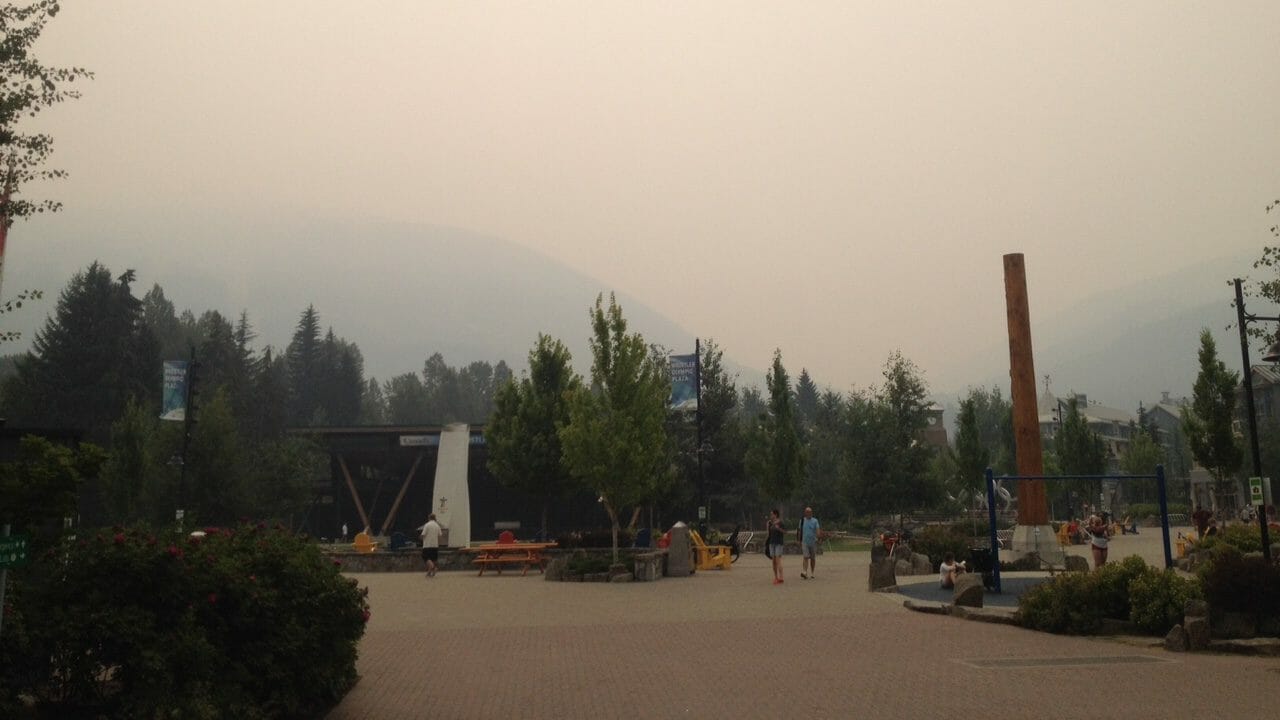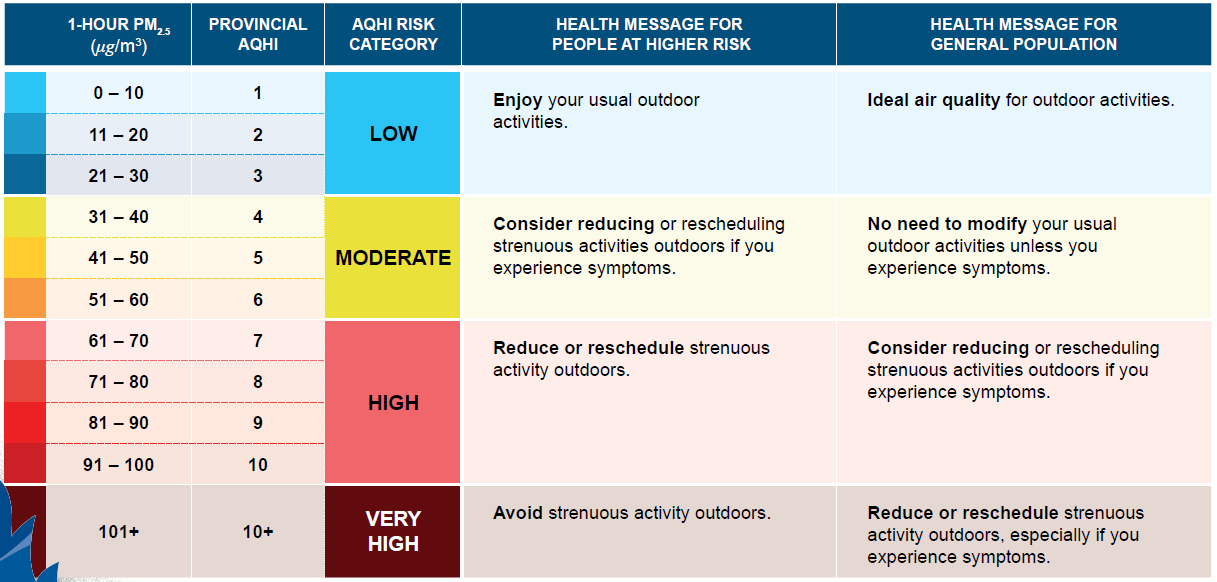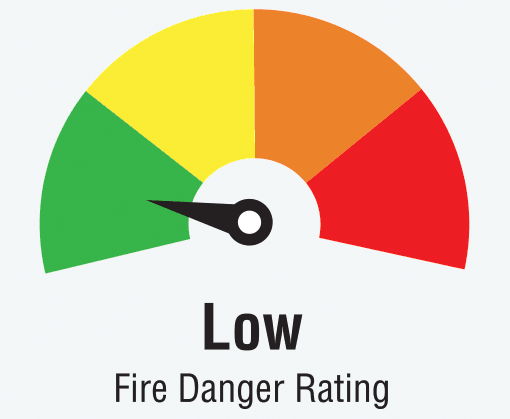
While Whistler normally has clean mountain air with low amounts of pollutants, during summer, Whistler may experience periods of poor air quality as a result of forest fire smoke from forest fires or wildfires nearby and from other regions. It is not possible to predict when wildfires will occur or if Whistler will be affected by poor air quality, so it is best to prepare for a smoky summer before the season starts.
Health impacts
Smoke from fires contains a variety of pollutants. Wildfire smoke is different from air pollution caused by traffic and industry but is still harmful to your health.
Smoky air makes it harder for your lungs to get oxygen into your blood and can irritate your respiratory system and cause an immune response. Common symptoms include eye irritation, runny nose, sore throat, mild cough, phlegm production, wheezy breathing, or headaches. Some people may have more severe symptoms, such as shortness of breath, severe cough, dizziness, chest pain or heart palpitations. People with these symptoms should seek prompt medical attention. Smoky air may increase risk of some infections, such as pneumonia in older people and ear infections and children.
The BC Centre for Disease Control (BCCDC) recommends the following groups should take steps to reduce their exposure to wildfire smoke:
- People with chronic conditions, especially lung and heart diseases
- The elderly
- Pregnant women
- Infants, young children
People with heart and lung diseases, who live near affected areas, should ensure that they have ample rescue medication available, and that they have a plan for seeking care if rescue medications are not controlling symptoms.
Visitors to Whistler, please note: The asthma medication Salbutamol which is sold under the brand name “Ventolin” in Canada is available by prescription only and not over the counter at pharmacies as it is in other parts of the world.
Most negative health effects of wildfire smoke are temporary and will disappear as the air quality improves.
Air Quality Advisories and Smoky Skies Bulletins
The British Columbia Ministry of Environment and Climate Change Strategy (MOECCS) monitors air quality in Whistler on a continuous real time basis from a monitoring station located at Meadow Park Sports Centre, north of the Village. Data from this station is publicly available on the BC Air Quality website and is updated hourly.
MOECCS will issue a Smokey Skies Bulletin to notify the public when wildfire smoke is likely to affect regional air quality over the next 24-48 hours. Air Quality Advisories are issued when pollutant concentrations approach or exceed predetermined limits, or when degraded-air-quality episodes are expected to continue or worsen.
In B.C., the current particulate matter levels can be used to estimate the current Air Quality Health Index (AQHI), which provides health advice for different risk categories. One-hour fine particulate matter (PM 2.5) can be used to estimate the AQHI (see table below with credit to the BC Centre of Disease Control).

What can I do to reduce my exposure to wildfire smoke?
Reducing exposure to wildfire smoke is the best way to protect against any health effects. Some ideas to reduce exposure include:
- Take measures to keep the air in your home as clean as possible. Purchase a portable air cleaner that uses HEPA filtration to remove smoke from indoor air. Use this Fact Sheet from the BC Centre for Disease Control to select a portable air cleaner that will work for you. If you have forced air heating, you can use different filters and settings to minimize the amount of wildfire smoke that comes into your home. Talk to your service provider about that will work best for your system.
- When you are driving, keep the windows up, the air conditioner on, and use the recirculate setting to limit intake of the outdoor air.
- Know where to find filtered air in Whistler. Both the Whistler Public Library and Meadow Park Sports Centre have filtered air.
- If you have a chronic disease, work with your doctor to create a management plan for smoky days.
- If you use rescue medications, make sure you have a supply at home and always carry them with you during wildfire season. Have a clear plan to follow if your rescue medications cannot bring your condition under control
- If you are pregnant or caring for an infant through wildfire season, make a plan for minimizing smoke exposure.
- The harder you breathe, the more smoke you inhale. Take it easy during smoky periods, consider exercising indoors, and drink lots of water to help your body cope with the smoke.
- If you have an outdoor occupation, speak to your employer about their smoke contingency plan and review resources from WorkSafe BC here.
- If your child attends an organized activity or summer camp during wildfire season, speak to the activity leader about their smoke contingency plan. Young children have sensitive lungs and may need to decrease activities during smoky periods, especially when outdoors.
- Smoke events are often accompanied by heat in the summer season. Be cautious about closing windows and doors if your home is not equipped with air conditioning to keep the house cool.
Resources
It’s important to know where to find the information you need when air quality is affected. The following are resources and websites that can help keep you informed on air quality and smoke in Whistler:
- Details on AQHI, hourly air quality readings, related health messages, and a list of regions with the latest ratings, can be found here: Air Quality Health Index – Province of British Columbia (gov.bc.ca)
- To go directly to the Whistler AQHI rating: Whistler – Air Quality Health Index – Province of British Columbia (gov.bc.ca)
- The Fire Smoke Canada Forecast shows maps of predicted smoke impacts over the next 48 hours.
- The Vancouver Coastal Health Wildfire Smoke webpage provides information on the health affects of wildfire smoke.
- The BC Centre for Disease Control Wildfire Smoke webpage also offers in-depth information about the health effects of wildfire smoke.
- Fire Smoke Canada Forecast shows maps of predicted smoke impacts over the next 48 hours.
- The provincial webpage for Air Quality Advisories is updated regularly during the summer months.
- The Whistler Air Quality Health Index (AQHI) provides a the current AQHI reading and associated health messaging.
- Install the Environment Canada WeatherCAN app to get notifications about Air Quality Advisories in your area.
- The provincial map of Active Wildfires keeps track of the current wildfire situation in British Columbia.
- For employers with questions about safe practices for their workers in smoky conditions: Wildfire Smoke: Frequently Asked Questions | WorkSafeBC
- Tips from the Government of B.C. on the best ways to stay safe from the impacts of wildfire smoke: Poor air quality from wildfires increases health risks to vulnerable people | BC Gov News
- To understand the RMOW’s work to support air quality: Air quality | Resort Municipality of Whistler

